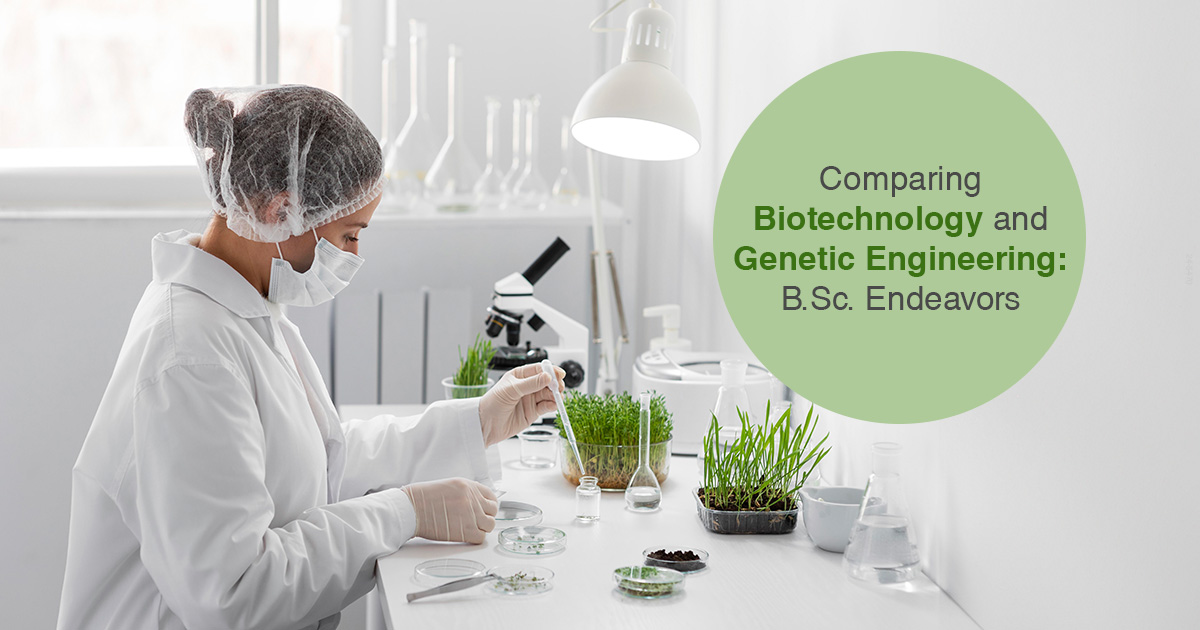Blog Detail


Comparing Biotechnology and Genetic Engineering: B.Sc. Endeavours
15-10-2024

Biotechnology and Genetic Engineering are closely related fields with significant advancements in recent years. Both fields involve genetically modifying and utilising living organisms to develop innovative solutions for various industries, including medicine, agriculture, and environmental management. Biotechnology encompasses a broader spectrum of techniques and applications, of which genetic engineering is a specialised area focusing on manipulating genetic material.
Both biotechnology and genetic engineering offer dynamic educational paths with distinct focuses on diverse aspects of biology, genetics, and technology. The choice between the two fields depends on individual interests, career goals, and the specific aspects of biology one finds most compelling. A broader perspective is provided by biotechnology, which covers a wide range of applications in medicine, agriculture, and the environment. On the other hand, genetic engineering is an area of specialisation with a focus on advanced genetic methods for the manipulation and modification of genetic material.
Course duration
B.Sc. Biotechnology programmes typically span three years, leading to a bachelor's degree. This duration includes foundational courses, core subjects, and electives.
Genetic engineering courses are often incorporated into broader biotechnology or molecular biology programmes. Therefore, the course duration for genetic engineering may align with the overall duration of the chosen programme and is also for three years.
Curriculum
The curriculum of a biotechnology programme is designed to provide students with a strong foundation in biology, chemistry, and relevant engineering principles. Practical training is a significant component of biotechnology programmes. Students engage in laboratory work to gain hands-on experience with various techniques and equipment used in biotechnological research. Coursework typically covers subjects such as:
- Cell Biology
- Microbiology
- Biochemistry
- Molecular biology
- Bioinformatics
- Bioprocess engineering
- Immunology
Genetic engineering courses are often integrated into biotechnology or molecular biology programmes. The curriculum includes in-depth studies on cloning, gene therapy, and the ethical considerations surrounding genetic engineering. Practical laboratory work is crucial, allowing students to gain hands-on experience in genetic engineering techniques. The curriculum equips students with a solid theoretical foundation and practical skills. Students focusing on genetic engineering delve into subjects like:
- Gene manipulation
- Genetic modification techniques,
- DNA technology
- Molecular biology
- Advanced genetic techniques
- Bioethics
- Bioinformatics
Career opportunities
Biotechnology plays a crucial role in shaping the future of medicine, agriculture, and various industries. Biotechnology graduates have a wide array of career opportunities. They can work in pharmaceutical companies, agricultural companies, healthcare institutions, research laboratories, and government agencies. Graduates with a degree in biotechnology can also pursue careers such as:
- Biotechnologists apply biological principles to develop new products and processes, from creating genetically modified organisms to improving crop yields or developing novel drugs
- Research scientists contribute to breakthroughs in genetics, molecular biology, and bioinformatics. Their work often leads to the development of new treatments, diagnostic tools, or sustainable technologies.
- Pharmaceutical sales representatives bridge the gap between scientific advancements and their practical applications, promoting and selling biotechnologically derived pharmaceutical products
- Genetic counsellors work with individuals and families, interpreting genetic test results and providing guidance on potential health risks
Genetic engineering specialists find opportunities in fields closely aligned with biotechnology. They play crucial roles in developing genetically modified organisms for agriculture, contributing to increased crop yield and resistance. Genetic engineering graduates find opportunities in pharmaceutical companies, research institutions, and biotechnology companies. The field is dynamic, with ongoing developments in technology and gene editing opening new avenues for professionals. This specialisation opens up unique career paths that involve working at the genetic level:
- Genetic engineers modify DNA to create desired traits or eliminate undesirable ones. They may work on developing genetically modified organisms for agriculture, engineering bacteria to produce pharmaceuticals, or contributing to advancements in gene therapy.
- Molecular biologists delve into the intricacies of cellular and molecular processes. They contribute to understanding genetic mechanisms and apply this knowledge to develop new technologies and therapies.
- Bioinformaticians decipher and analyse complex genetic information and play a crucial role in unravelling the mysteries encoded in DNA. They apply computational methods to biological research.
Both biotechnology and genetic engineering are dynamic fields with promising future trends. Advances in technology, synthetic biology and personal medicine will likely shape the future landscape of genetic engineering. Overall, biotechnology is expected to continue its role in sustainable agricultural production, environmental protection and breakthroughs in medical research. These two areas offer promising prospects for students who wish to challenge the boundaries of science and technology. Graduates from such programmes are expected to majorly impact global issues and shape the future of science and technology, as the biotechnology landscape continues to evolve.